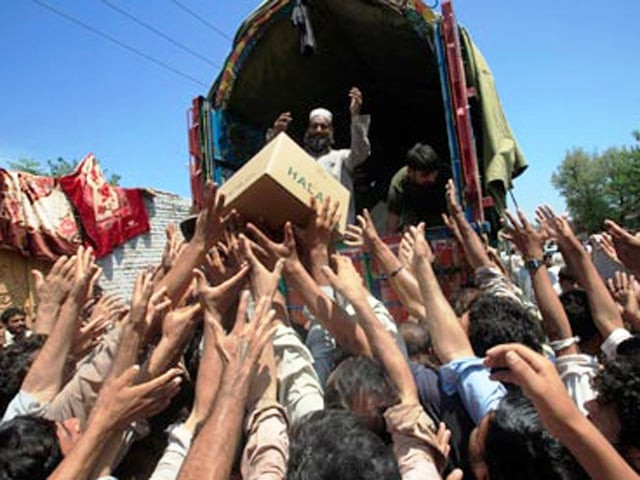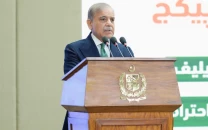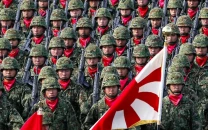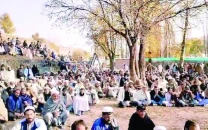Rethinking Poverty: The Rise of New Poor in Pakistan
Pakistan’s middle class is now part of the ‘new poor’ as inflation and unemployment rise.

One fine morning, Gregor Samsa, once a cornerstone of his family’s livelihood, wakes up from a troubled dream and finds himself transformed into an insect, a cockroach.
This surreal opening in Franz Kafka’s Metamorphosis encapsulates a reality that resonates with the countless Pakistanis who experienced their “Metamorphosis”.
Previously maintaining a stable lifestyle, the Pakistani middle class now belongs to a burgeoning class of “New Poor”, tackling economic vulnerabilities unimaginable before COVID-19.
Pakistan has experienced an array of setbacks in recent years that have overwhelmingly shaped its economy. Global supply shocks, catastrophic floods, and political unrest have led to skyrocketing inflation, increased unemployment, and widening gaps since COVID-19.
The “New Poor” has emerged amid these challenges, a term coined for the growing but mostly brushed-aside class of Pakistan’s urban landscape.
This class consists of individuals who were previously enjoying a stable financial status or were on the verge of escaping poverty, but have been pushed into poverty because of Pakistan’s deteriorating economic conditions.
In contrast to classic chronic poor, they reside in areas with adequate infrastructure, are educated and employed in non-agricultural sectors. Young people between 15-35 years, women and senior citizens predominantly make up the majority of this class.
Gregor’s Kafkaesque transformation was not only physical, it was an emblem of the loss of dignity, agency, and purpose— similar to Pakistan’s new poor current predicament. They are grappling to maintain an adequate lifestyle in the face of challenging economic conditions.
Their struggle to fulfil their basic needs, compounded by soaring expenses and limited income, has led to a substantial shift in household expenditure patterns and decision-making.
Pakistan’s New Poor have been compelled to adjust their expenditure patterns to sustain their necessities. These changes are apparent in the increased usage of intercity Metro bus services, with thousands of commuters parking their cars waiting in long queues every morning to save fuel expenses
. Many households have reduced their expenditure on food and groceries, undermining their health by solely relying on basic medicines like Panadol.
Several households have shifted to lower-cost neighbourhoods and invested in solar panels to reduce electricity costs. Fine dining and family vacations are now privileges reserved for the elites only. Besides cutting expenses, these new poor have taken on remote jobs and part-time work to supplement their income, borrowed money or received financial help from families.
The government’s response has been parallel to Gregor’s parents’ indifference in Kafka’s tale. The government’s response to the rise of the new poor has been inconsistent, with financial transfers along with fuel and power subsidies during lockdown to complete neglect after the pandemic.
Following economic shocks like floods, inflation and high taxes made life worse for this new class. Social protection programmes, traditionally focusing on the chronically poor, have failed to address the special requirements of these new poor, leaving them abandoned, similar to Gregor’s abandonment by his family.
A recent study conducted by the Islamabad Policy Research Institute explores the socioeconomic factors and coping mechanisms of the new poor in five urban cities.
It indicated that more than 70% of Pakistanis have been unable to save money and are struggling to meet their expenses within their monthly income by cutting down on food and healthcare services.
Surprisingly, the majority of households have prioritised education, unwilling to compromise on its expenses.
However, the results of the study suggest that attaining higher levels of education has not protected them from being new poor. The findings of the study emphasise that these new poor are different from the chronic poor and require tailored solutions from the government.
In Kafka’s Metamorphosis, the tragic end of Gregor’s life with his quiet demise serves as a sobering wake-up call and a cautionary parable of what happens when alienation and neglect are left unattended. Pakistan cannot afford for its middle class to mirror its fate.
This relatively large and unaddressed group calls for an immediate response from the government by developing an inclusive policy to address their needs with targeted measures.
To reverse their dismal trend and promote a resilient economy, initiatives including universal basic income, universal basic services, gender inclusive policies and social protection programs geared towards the new poor are required to ensure their survival and upward mobility. To avoid the Kafkaesque tragedy, the time is now to act to break the cycle of indifference with resolve and vision before the backbone of the economy crumbles into irreversible decay.
Maryam Ayub writer is an economist based in Islamabad and can be reached at maryamayub749@gmail.com



















COMMENTS
Comments are moderated and generally will be posted if they are on-topic and not abusive.
For more information, please see our Comments FAQ